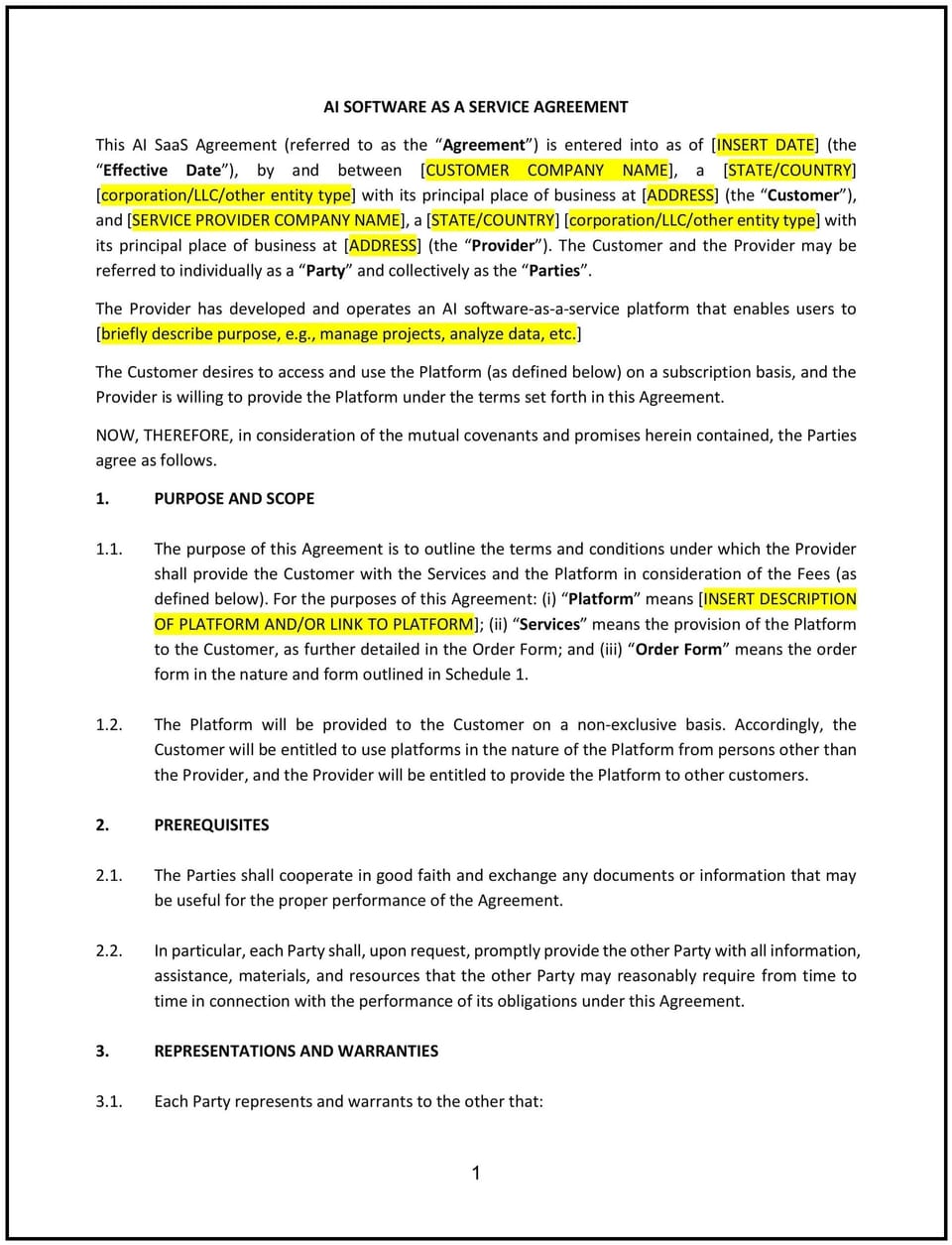AI SaaS Agreement (Idaho): Free template

AI SaaS Agreement (Idaho)
An AI SaaS Agreement is a contract between a software provider and a client that outlines the terms and conditions for accessing and using an AI-powered software-as-a-service (SaaS) platform. In Idaho, these agreements are commonly used in industries like agriculture, healthcare, and technology, where AI-driven tools can optimize operations, improve decision-making, and enhance efficiency.
Idaho’s legal framework, including the Idaho Uniform Commercial Code (UCC) and consumer protection laws, ensures that AI SaaS Agreements are enforceable when properly drafted. For example, a Boise-based agricultural company might use an AI SaaS Agreement to implement a crop yield prediction platform, ensuring compliance with state-specific regulations and industry standards.
Tips for drafting and maintaining an AI SaaS Agreement in Idaho
- Define the scope of services: Clearly outline the AI SaaS platform’s features, functionalities, and limitations. Specify whether the platform includes machine learning, natural language processing, or other AI capabilities.
- Example: “The Provider grants the Client access to an AI-powered SaaS platform that includes predictive analytics, data visualization, and automated reporting tools.”
- Include subscription terms: Specify the subscription model, whether monthly, annual, or usage-based, and include pricing, invoicing, and payment deadlines. Idaho law requires clarity in payment terms to avoid disputes.
- Example: “The Client agrees to pay a monthly subscription fee of $1,000, with invoices due within 15 days of receipt. Late payments will incur a 1.5% monthly interest fee.”
- Address data privacy and security: Ensure the agreement complies with Idaho’s data protection laws and includes provisions for safeguarding sensitive information. If the platform processes personal data, include compliance with federal regulations like HIPAA or GDPR (if applicable).
- Example: “The Provider agrees to implement industry-standard security measures, including encryption and access controls, to protect the Client’s data from unauthorized access.”
- Set performance metrics: Define measurable goals, such as uptime guarantees, response times, or accuracy rates for AI predictions, to ensure the Provider meets the Client’s expectations. Include penalties or remedies for failing to meet these metrics.
- Example: “The Provider guarantees 99.9% system uptime and a maximum response time of two hours for critical issues. Failure to meet these standards may result in a 10% discount on the monthly subscription fee.”
- Include termination clauses: Specify the conditions under which either party can terminate the agreement, such as breach of contract or failure to meet performance standards. Idaho law allows for termination with reasonable notice unless otherwise specified.
- Example: “Either party may terminate this agreement with 30 days’ written notice if the other party fails to fulfill its obligations. In the event of termination, the Provider will assist in transitioning data to the Client or a new provider.”
- Align with Idaho laws: Ensure the agreement adheres to Idaho’s UCC and other relevant regulations, particularly for contracts involving the sale of goods or services.
- Example: “This agreement shall be governed by and construed in accordance with the laws of the State of Idaho. Any disputes arising from this agreement shall be resolved in the courts of Ada County.”
- Include intellectual property (IP) clauses: Specify who owns the AI algorithms, data, and other intellectual property. Idaho law defaults to the creator owning IP unless otherwise agreed.
- Example: “All intellectual property, including AI algorithms and software, remains the exclusive property of the Provider. The Client retains ownership of its data uploaded to the platform.”
- Add a force majeure clause: Idaho businesses may face disruptions due to extreme weather or other unforeseen events, so include a clause addressing such scenarios.
- Example: “Neither party shall be liable for delays or failures in performance due to events beyond their reasonable control, including but not limited to natural disasters, acts of terrorism, or government restrictions.”
Frequently asked questions (FAQs)
Q: Is an AI SaaS Agreement enforceable in Idaho?
A: Yes, as long as the agreement is clear, reasonable, and complies with Idaho contract laws, it is legally enforceable. Idaho courts generally uphold well-drafted contracts.
Q: What industries commonly use AI SaaS Agreements in Idaho?
A: Industries such as agriculture, healthcare, technology, and manufacturing frequently use AI SaaS Agreements in Idaho to implement AI-driven tools for data analysis, automation, and decision-making.
Q: Can an AI SaaS Agreement include penalties for late payments in Idaho?
A: Yes, the agreement can include late payment penalties, but they must be reasonable and clearly stated to comply with Idaho’s usury laws. Excessive penalties may be deemed unenforceable.
Q: How can disputes over an AI SaaS Agreement be resolved in Idaho?
A: Disputes can often be resolved through negotiation or mediation. If necessary, they may be resolved in court or through arbitration, depending on the terms specified in the agreement. Idaho courts are known for their efficiency in handling business disputes.
Q: Does Idaho have specific data privacy laws that affect AI SaaS Agreements?
A: While Idaho does not have a comprehensive data privacy law, businesses must comply with federal regulations like HIPAA (for healthcare) and industry standards for data protection.
Q: Can an AI SaaS Agreement include a non-compete clause in Idaho?
A: Yes, but non-compete clauses must be reasonable in scope, duration, and geographic area to be enforceable under Idaho law. Overly restrictive clauses may be struck down by courts.
Q: What should I do if the Provider fails to meet the agreed-upon service levels?
A: The agreement should include remedies for failure to meet service levels, such as discounts, credits, or termination rights. Ensure these remedies are clearly outlined to avoid disputes.
This article contains general legal information and does not contain legal advice. Cobrief is not a law firm or a substitute for an attorney or law firm. The law is complex and changes often. For legal advice, please ask a lawyer.


